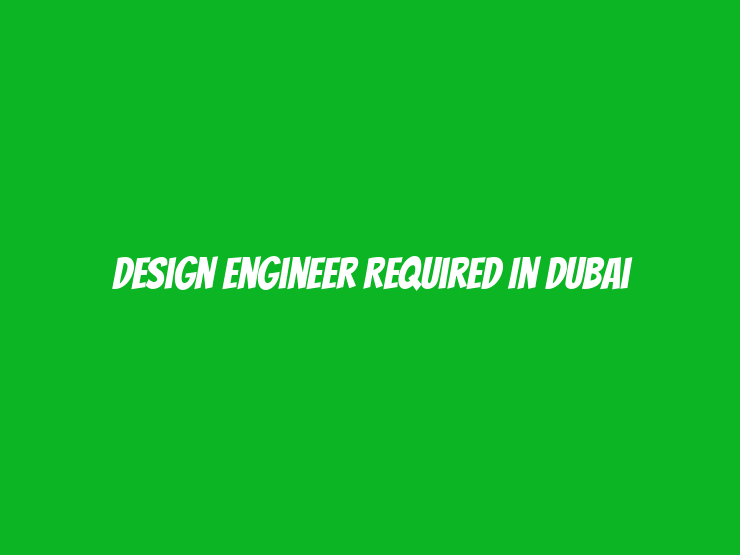A Design Engineer is a professional responsible for developing and designing products, systems, or structures across various industries, including manufacturing, construction, and technology. This role involves a combination of creativity and technical expertise, as Design Engineers must balance innovative ideas with practical application. They collaborate with other engineers, architects, and stakeholders to ensure that designs meet specifications, regulations, and user needs.
| Experience | 3 years |
| Salary | $1,500 – $2,000 |
| Location | UAE, Dubai |
| Qualification | Bachelor’s degree / higher diploma |
| Posted | 28 September 2024 |
| Job Type | Full-Time |
| Posted by | Habeebi Recruiter |
| last date to apply | apply within 15 days |
Key Responsibilities
1. Concept Development
Design Engineers begin their work by developing concepts for new products or systems. This involves brainstorming ideas, conducting feasibility studies, and creating initial sketches and models. They utilize computer-aided design (CAD) software to bring their concepts to life, ensuring that designs are both functional and aesthetically appealing. The ability to think creatively while considering practicality is essential during this phase.
2. Detailed Design and Prototyping
Once a concept is approved, Design Engineers create detailed designs and specifications for the project. This includes preparing technical drawings, selecting materials, and defining manufacturing processes. They often develop prototypes to test and validate their designs, allowing for adjustments and improvements before mass production. This iterative process is critical to ensuring the final product meets quality and performance standards.
3. Collaboration with Cross-Functional Teams
Design Engineers work closely with cross-functional teams, including manufacturing, marketing, and quality assurance departments. Effective collaboration ensures that all aspects of the product development process align with business objectives and customer needs. Design Engineers must communicate their ideas clearly and be open to feedback from team members to refine their designs.
4. Compliance with Industry Standards
A key responsibility of a Design Engineer is to ensure that their designs comply with industry standards, regulations, and safety requirements. This involves staying updated on relevant codes and guidelines that impact the design process. By adhering to these standards, Design Engineers help mitigate risks and ensure that products are safe and reliable for end-users.
5. Problem-Solving and Troubleshooting
Throughout the design and development process, Design Engineers must address various challenges that arise. They use their analytical skills to identify problems, propose solutions, and implement necessary changes. This problem-solving aspect is crucial, as it directly impacts the project’s success and the quality of the final product.
6. Documentation and Reporting
Design Engineers are responsible for maintaining comprehensive documentation of their design processes, including specifications, calculations, and changes made during development. This documentation serves as a reference for future projects and assists in maintaining compliance with industry standards. They may also be required to prepare reports for management or clients, detailing project progress and outcomes.
7. Continuous Improvement and Innovation
In the fast-paced world of design engineering, continuous improvement and innovation are vital. Design Engineers are encouraged to seek out new technologies, materials, and methodologies that can enhance their designs and streamline the development process. By staying informed about industry trends and advancements, they contribute to the organization’s competitiveness and success.
Qualifications
- Bachelor’s degree in Mechanical Engineering, Civil Engineering, Electrical Engineering, or a related field.
- Proven experience in design engineering or a similar role.
- Proficiency in CAD software (e.g., AutoCAD, SolidWorks, CATIA).
- Strong analytical and problem-solving skills.
- Excellent communication and teamwork abilities.
- Knowledge of industry standards and regulations.
- Ability to manage multiple projects and meet deadlines.
The role of a Design Engineer is crucial in bringing innovative ideas to fruition. By combining creativity with technical knowledge, Design Engineers create products and systems that meet the needs of users while adhering to safety and quality standards. Their contributions play a significant role in the success of various projects and the overall growth of their organizations.
How to apply:
Send your updated resume to our email or directly reach us at our phone:
Email: collaborate@pluginpower.org
Telephone: +971 (0) 4883 7791

